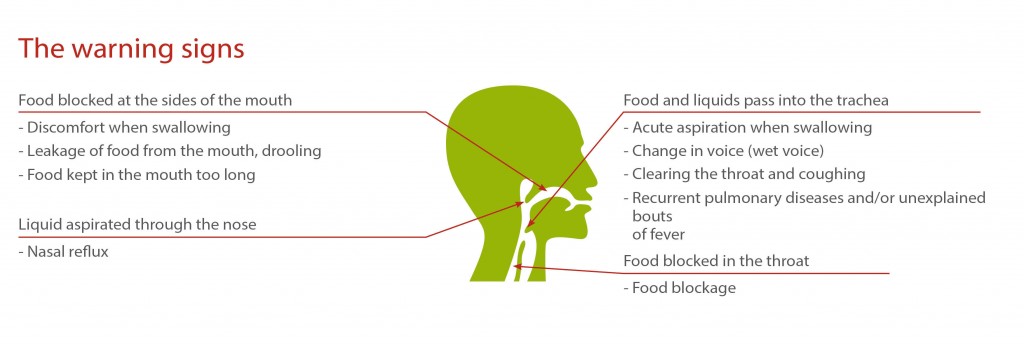How to manage it day-to-day
Detection, coping and treating it
Detection: warning signs
 Do not forget the quiet signs! Refusal to eat or drink, increase in duration of meal time. But also dramatic weight loss, dehydration, acute respiratory diseases, drooling, malnutrition, etc. It is essential to ask the patient questions!
Do not forget the quiet signs! Refusal to eat or drink, increase in duration of meal time. But also dramatic weight loss, dehydration, acute respiratory diseases, drooling, malnutrition, etc. It is essential to ask the patient questions!
Coping strategies
To ensure safe hydration on a day-to-day basis, it is necessary to take the following points into consideration:
- The importance of the patient’s posture in order to protect the airways when swallowing: lower the head and gently push the chin inwards, maintaining a seated position with the body upright, with the carer positioned at the same height as the patient.
- Stimulation using fizzy or sparkling substances, acidity, temperature (hot or cold) affects swallowing performance and makes it possible to reduce the number of instances of substances going down the wrong way. The colder the temperature of the liquid, the stronger the taste, the more pungent the smells, the stronger and faster the swallowing process will be.
- The purpose of thickening liquids is to provide viscosity and slow the speed at which they flow into the throat. The thicker the texture, the more the rate of the liquid’s advance in the throat is slowed down, and the more the risk of substances going down the wrong way is reduced.
In order to establish the level of liquid thickening suitable for patients, Nutrisens Medical has developed the D.S.A pack, which uses 4 types of liquids ranging from tap water to thickened or gelled water. The different levels of viscosity associated with sensory and sensitive stimulations are called ‘GRADES’ in this test. Each grade of liquid uses both sensitive stimulation of the mouth and the throat (temperature, flavouring) and a reduction in the speed of the liquid (viscosity, yield point).
- Adapting the texture of foods is also necessary to maintain daily nutritional intake and to avoid the risk of malnutrition. Food textures were defined in May 2007 by the French Market Research Group on Institutional Catering and Nutrition (GEMRCN). Additional high-protein and high-calorie compotes or creams may also be recommended depending on medical opinion.
